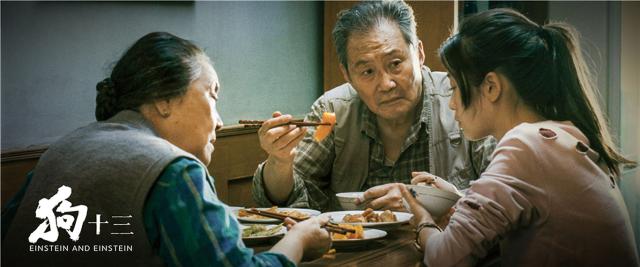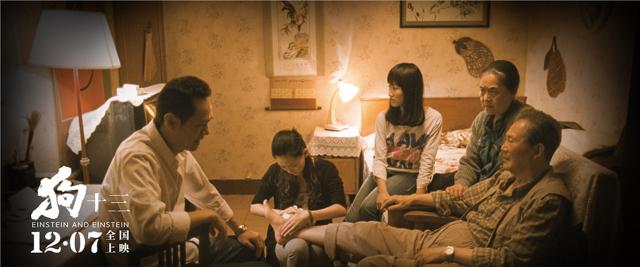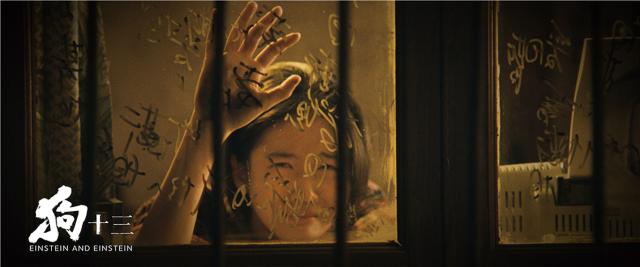“Growing up is murder,” reads the tagline on poster for Cao Baoping’s latest release. Einstein and Einstein is about a 13-year-old girl who struggles with lowered expectations, discipline and punishment from a distant father and grandparents who only seem to care about turning her into an obedient adult.
The film made its international debut at South Korea’s Busan International Film Festival in 2013, but waited five years in the wings for a general release. Cao has since released The Dead End (2015) and Cock and Bull in China (2016). The Dead End won him Best Director at the 18th Shanghai International Film Festival.
With its underlying politics and edgy metaphors, Einstein and Einstein tackles wider cultural and social issues – feminism, parenting methods, animal cruelty and the collision of China’s modernization and traditional values – from the point of view of a typical Chinese millennial.
Set in Xi’an, Einstein and Einstein tells the story of Li Wan (played by actress Zhang Xueying), an intelligent yet introverted teen who moves in with her grandparents after her parents divorced and father remarried. Quiet and reserved, Li feels neglected by her father and craves his attention. The situation becomes increasingly nuanced after her father’s new wife gives birth to a son, a fact the family kept from Li.
Too busy with his new life and work, the father, torn by guilt, buys Li a puppy to cheer her up. Li initially rejected the dog and treated it horribly, but gradually becomes attached to her pet. She names it “Einstein” because of her interest in astrophysics.
Unfortunately, the dog goes missing. Not only does the family show no interest in finding it, her stepmother tries to pass off another puppy as Einstein. Li’s insistence on finding her dog causes further family discord, resulting in accusations, cruelty and violence.
On the surface, Einstein and Einstein seems an unlikely project for Cao, known for his compelling, black-humored crime dramas. Domestic media had already dubbed him the Chinese Quentin Tarantino. But Cao insists it’s also a crime film – about the murder of one’s true self. We witness a teenage girl’s evolution from a lonely, quietly rebellious only child to a maturing young adult learning to cope with compromise and lies.
“Even though no real crime takes place, it shares something strikingly common with crime films – the prevalent yet unnoticed cruelty, violence and turbulence of daily life, both psychologically and emotionally,” Cao told ifeng.com.
“Everyone can see a shadow of themselves in this story,” said Cao. “I reckon there are not many people who would say ‘I had a pretty cruel childhood.’ But when we concentrate these daily experiences into one film, it’s easy to feel the cruelty of it all,” Cao added.
The film notched 8.3 out of 10 on China’s leading content review website Douban, sparking discussions on social media about parenting issues and the meaning of “growing up” with Chinese values.
“When people praise a child for being well-behaved how do they know the kid isn’t just scared or depressed, or holding back their true feelings?” posted social media user “Indecent Time.”
“The way to deal with inequality is to give in to it and never speak up for our own rights – that’s how we are taught generation after generation, and that’s why we grow up into obedient adults and continue to teach our children to be obedient,” Douban user “Tao Tao” commented.
“Every one of us is Li Wan. Life has worn down our edges and temper, and we’ve lost our personality and everything that once made us unique. We have been encouraged to do things that defy our principles, say things against our will, and forget our original loves and passions. Dogs are always dogs but humans are sometimes inhuman,” another Douban user “Lin Rui” commented.
The narrative is limited to Li’s perspective, which helps to convey her confusion, frustration and distress. However, the greater message is what makes the film exceptional.
At a preview on November 13, Cao asked the audience: “If growing into adults suggests one’s own true self is meant to be killed, then who is to blame?” From his perspective, the film does not simply explore parenting methods or a problematic father-daughter relationship. “The story essentially talks about authoritarianism existing in family and society.” Cao said he wanted to reveal the oppressive hierarchy that exists in the family structure of traditional Chinese culture.
“Chinese family and society operates in hierarchical order. Children must obey their elders. Elders are always right no matter what they say. This kind of order is not established on treating each other equally as individuals. It’s a path that Li Wan has to walk in the process of growing up under such a social structure. We need to reflect on the meaning of ‘being good’ and ‘growing up’ in the Chinese context,” Cao said.
Among the film’s layered metaphors is its Chinese title, which can translate as “Dog 13,” “A Dog and a 13-year-old Girl” and also “The Dog’s Life of a 13-year-old.” Moreover, the poster’s title is written in a calligraphy style that purposefully obscures the “13” to look like a “B.” The resulting title appears as “Dog B” – an offensive curse word in Chinese. “Dog B” can also be read literally as “the second dog,” a reference to the replacement Einstein.
“On the surface, the title ‘Einstein and Einstein’ seems to refer to Li Wan’s two dogs, but, essentially speaking, the dog is obviously a metaphor for Li Wan since they share the same fate and situation: being neglected, marginalized, punished and disciplined,” film critic Zeng Yuli told NewsChina.
Li’s relatives are not villains, just flawed, ordinary people. She lives with her grandparents, who are part of an older generation known for extreme conservative views. They refuse to comment on current affairs on television and hardly ever leave the house.
She grows up in a traditional family that values boys over girls. Her name, “Wan,” which can translate to mean “play” or “fun,” was casually chosen by her parents, while her stepbrother’s name, “Zhaozhao” was seriously deliberated on. As her grandmother says in the film, “a son’s name should not be chosen like a daughter’s.”
We watch as Li’s two-year-old brother gets away with bad behavior, including hitting the dog and hurting his grandmother, while Li is severely punished for accidentally hurting her grandfather.
Li repeatedly denies her individuality. For example, her intellectual passions lie in physics, but her father instead forces her to join the English club to gain a higher score on exams. She anxiously waits for her father to take her to the planetarium as promised, only for him to make her attend his business banquet.
The banquet is a pivotal and highly symbolic scene of clashes between science, culture and values. Li is asked by an older gentleman of high status what books she likes to read. When she answers Stephen Hawking’s A Brief History of Time, the man frowns slightly and calls Hawking’s ideas childish compared to Confucian ideas on the concept of time. He later praises Li’s little brother Zhaozhao for learning to recite classical poetry.
“What makes the story appealing and thought-provoking is that it does not take a simple binary approach to present the worlds of teens and adults. It is not an antagonistic relationship. In fact, they are all victims. The film piercingly observes the truth of adulthood: no one can escape the huge, omnipresent web of order and discipline. It’s a war doomed to defeat,”Zeng said.
Einstein and Einstein won acclaim from media and netizens as one of the best domestic teen films of the last decade, mostly owing to its realistic portrayal of teenage life, a departure from recent mainstream teen films.
China’s recent love for youth-oriented films began in 2013 with three commercially successful releases in the same year: Vicki Zhao Wei’s directorial debut So Young, Peter Chan Ho-San’s American Dreams in China and writer-turned-director Guo Jingming’s Tiny Times.
Since then, similar films have broken box office records, such as The Continent, My Old Classmate, Fleeting Time, Left Ear and Ever Since We Love.
“Teen genre films have been mass-produced in China ever since 2013. Each have the same background and similar story-telling structure as if they’re copying one another,” Zhang Wuyi, a film researcher at Tianjin Normal University, told NewsChina.
“[Settings like] libraries, classrooms and basketball courts, subjects like ugly school uniforms, drinking and loyalty among friends, and era-specific items such as cassettes and CDs… are largely used in teen films chiefly to coax feelings from the audience of nostalgia for their youth and bygone school days.” ��
These films often involve similar plots – campus romances, adolescent anxiety, forms of rebellion and sex. Many also include young characters dying in a car accident or from a serious illness. Accidental pregnancy and abortion have been invariably used as plot devices. Netizens mockingly refer to the films So Young, My Old Classmate and Fleet of Time as the “abortion trilogy.”
“With a pure, innocent and nostalgic aesthetic, these films have romanticized and dramatized teenage life, which basically neglects reality and [instead] presents archetypical youth tropes,” Zhang said.
Einstein and Einstein, nevertheless, takes a realistic approach to depicting teenage life. As the director points out, the reason why the film’s general release had been delayed for five years was to wait for “better timing.” “We hoped the film would be more influential and reach a wider audience,” Cao said.
Cao indicated that the entire film industry over the past few years was filled with popcorn blockbusters and big-budget commercial films. The majority of moviegoers just wanted to be entertained. However, nowadays an increasing number of Chinese viewers are appreciating the charm and richness of realism, which bolstered Cao’s confidence.
The year of 2018 witnessed a boom in low-budget, social realism films thanks to audience support.
For example, Dying to Survive outperformed Hollywood blockbusters Avengers: Infinity War and Jurassic World: Fallen Kingdom, taking in more than three billion yuan (US$44.1million) at the box office. Based on a true story, Dying to Survive revolves around a man smuggling and selling cheap generic versions of leukemia drugs for people living with cancer.
Dark comedy A Cool Fish garnered both critical acclaim and better-than-expected ticket sales at the box office. It tells of several underdogs marginalized by society who struggle with failed ambitions, wounded masculine pride, ceaseless quests for wealth and status, public humiliation and lack of basic dignity. The film provides a humanistic criticism of contemporary China’s overstretched society.
In his recently published essay “Chinese Films Move Toward Realism,” Li Daoxin, professor at the School of Arts, Peking University, points out that realism genres are poised to be the future impetus of the Chinese film industry that can compete with popcorn blockbusters.
“Mass-produced domestic films have seen a decline both at the box office and in reception over the past few years. These films, lacking in quality and sincerity, fail to present the authentic life experiences and true feelings that connect with audiences,” Li wrote.
“Realism films with in-depth reflections on humanity and current social issues have increasingly become an audience preference. Chinese moviegoers no longer simply seek entertainment, but tend to choose films that provide a strong sense of resonance and involvement. Realism will become a major direction for future Chinese filmmaking” Li added.

 Old Version
Old Version



